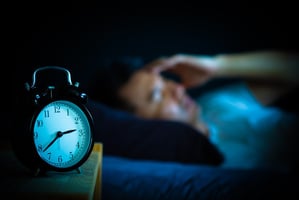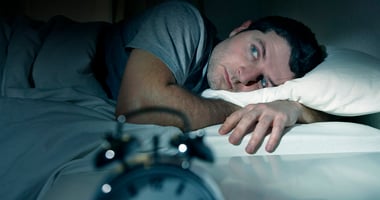Poor Sleep Linked to Self-Harm in Adolescents

Poor sleep may raise the risk of self-harm in adolescents, a study in the Journal of Child Psychology and Psychiatry has found.
Michaela Pawley, Ph.D., of the University of Warwick in the United Kingdom, and colleagues analyzed data from 10,477 participants in the Millennium Cohort Study, an ongoing multidisciplinary study that has been following people in the U.K. who were born between 2000 and 2002. When the participants were 14, they were asked:
- What time they went to sleep and woke up on school and non-school days (sleep duration)
- How long it usually took them to fall asleep during the last four weeks (sleep onset latency)
- How often they had woken up and had trouble falling back asleep in the last four weeks (night awakenings)
The researchers also calculated participants’ social jet lag—the difference between their sleep midpoint on non-school days and school days.
The participants were asked about self-harm when they were 14 and again when they were 17.
Pawley and colleagues found that shorter sleep duration on school days, longer sleep onset latency, and more frequent night awakenings were significantly associated with self-harm at 14 and 17, whereas weekend sleep duration and social jet lag were not.
The researchers noted several possible explanations for the association between poor sleep and self-harm. First, the cumulative effect of short sleep duration during the week contributes to chronic sleep deprivation, which has adverse effects on mood and physical health. Second, long sleep onset latency may reflect underlying attentional difficulties such as mental sluggishness, distractibility, and/or excess daydreaming—which are also self-harm risk factors.
Night awakening, meanwhile, “may be considered a unique predictor in our study due to its influence on both micro- and macro-sleep architecture,” the researchers wrote. “Individuals who awaken frequently throughout the night may struggle to obtain enough REM sleep, developing deficits in emotion regulation and [the] ability to implement healthy emotional responses.”
Pawley and colleagues said that cognitive-behavioral therapy for insomnia (CBT-I) may address the three risky sleep problems they identified. However, they added that current etiologic models of insomnia were derived from adults and that little is known about the interplay of factors associated with adolescent sleep problems. In turn, it is unknown whether those factors would influence the effectiveness of CBT-I in adolescents.
For related information, see the Psychiatric News articles “Sleep Problems in Late Childhood, Early Adolescence Linked to Psychiatric Symptoms” and “Novel Therapies Aim to Boost Teen Sleep and Mood.”
(Image: Getty Images/iStock/Vyacheslav Dumchev)
Don't miss out! To learn about newly posted articles in Psychiatric News, please sign up here.





